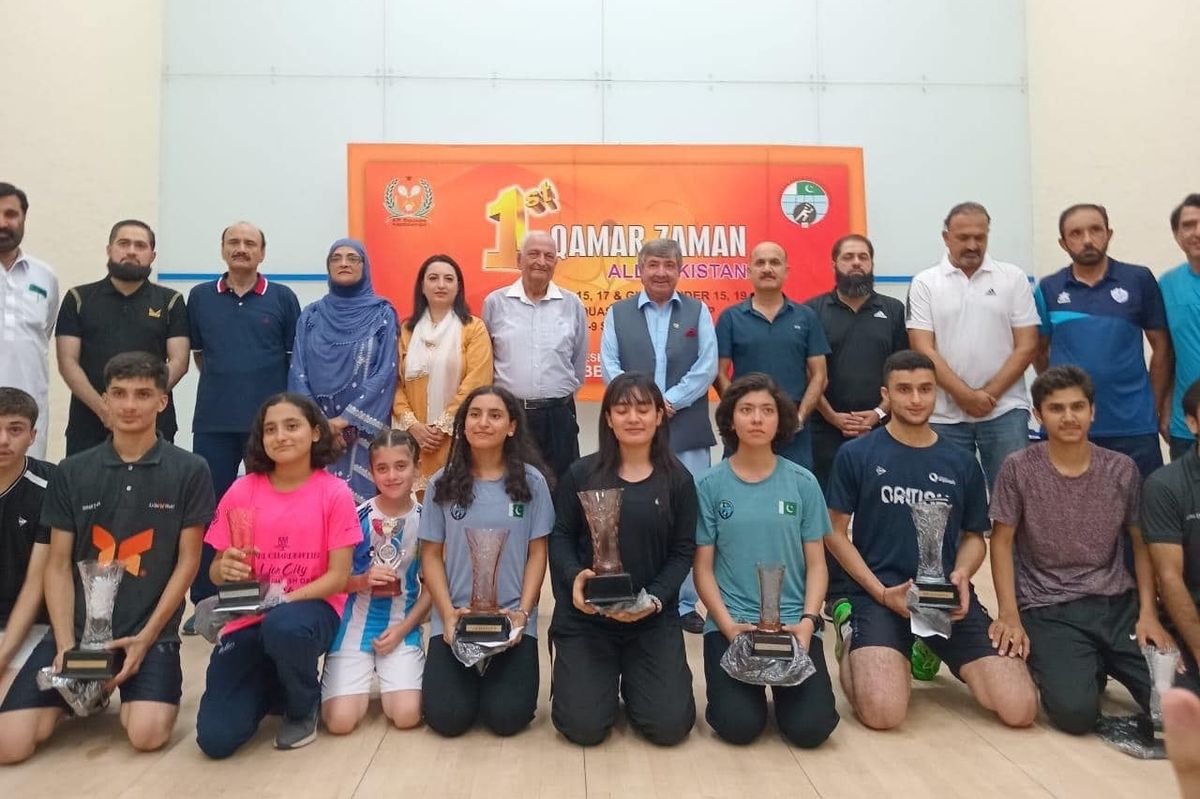Squash legend Qamar Zaman urges Pakistani players to train harder for global success
Presently, only four Pakistani squash players are in the top 100 world squash rankings, a far cry from the days when there used to be around seven of their professionals in the top-10 list

Alam Zeb Safi
Correspondent Nukta
Alam Zeb Safi is a sports journalist, having served in the capacity for 25 years. Covered so many international sports events on foreign soil also including England and Australia.

Qamar Zaman (centre) poses with athletes and officials at the 1st Qamar Zaman All Pakistan Boys and Girls National Championship.
Facebook/Qamar Zaman
Squash legend Qamar Zaman has voiced his frustration about how Pakistani players approach their careers, stating that none of the current squash players seem capable of reaching the top 20 in the world rankings.
"I’m deeply upset. I don't see anyone among the current players who can break into the top 20 world rankings," Qamar told Nukta in an interview.
Presently, only four Pakistani squash players are in the top 100. Asim Khan, who recently won the Charlottesville Open Squash Championship in Virginia by defeating England’s top-seeded Nick Wall in a 65-minute match, is ranked 72nd. Noor Zaman is ranked 81st, followed by Nasir Iqbal at 84, and Mohammad Ashab Irfan at 86. It’s a far cry from the golden days of the past when Pakistan used to have around seven of their players in the top-10 world rankings.

Lack of hard work
Qamar stressed that although Pakistan is rich in talent, the lack of hard work among players is what holds them back.
"The main problem with our players is they don’t work hard. We have no shortage of talent, but squash is an individual sport, and the effort you put in determines your success," said Qamar, who won the British Open in 1975 by defeating fellow Pakistani Gogi Alauddin in the final.
The 72-year-old offered a specific solution—more intense training—as a guaranteed method to improve players’ rankings. He also cited the example of former squash greats like Jahangir Khan and Jansher Khan, while stressing his point.
“If the current lot start training for four hours in the court and one hour outside the court on a daily basis, I guarantee you that everyone will be in the top 20,” he said.
“I used to train for over four hours. Jansher Khan and Jahangir Khan’s work ethics were also way superior and that is why those players achieved global repute. Nothing comes with ease and you have to work hard. There is no leave in squash, no off-days,” he added.

Qamar, who was also referred to as 'The Stroke Master', stressed the importance of discipline, especially regarding proper sleep and personal habits, in building a successful squash career.
“If you want to achieve something big in squash you will need to handle your entire life with too much discipline. If a player goes to bed at 3am in the night, how he will train in the day. This is ridiculous. Players should love their careers and should adapt quality work ethics supported by strong off the court discipline,” he said.
“If you don’t sleep for seven to eight hours how will you handle your work load? In squash you need top stamina, strength, speed, eye work, brain work and if you don’t train hard and regularly you will lag behind,” he added.
Qamar shifts the responsibility onto the players themselves, saying that while the Pakistan Squash Federation (PSF) has provided the infrastructure, it’s up to the players to make use of it.
“The (Pakistan squash) federation has given you squash courts and it is now your duty to train hard and make your future bright. I will credit Pakistan Air Force (PAF) which has established 15 to 20 squash courts in the country where players can train. And if they don’t train and take unnecessary offs, then it’s the fault of the players and not of the federation,” Qamar said.
Better infrastructure required
He also stressed the need for establishing more squash courts in the country, to give talented young players from underdeveloped areas the chance to succeed.
“There is a lot of talent in Pakistan and even in the tribal belt there is good talent, but there is a dire need of squash courts there, so that youngsters of that region could practice and realize their dreams of becoming good players,” Qamar said.
“If we are to progress and regain our lost glory, we will have to expand the infrastructure,” he added.
Qamar remains optimistic that with enough passion and drive, a new champion could emerge, but it requires the right mindset and determination from the players.
“If a mad boy comes and he trains with passion so nothing is impossible. I told you earlier that players should have hunger for achieving big in life and if you are happy with your current position and don’t want to become world champion then nothing will happen. You have to make things happen,” Qamar concluded.










Comments
See what people are discussing